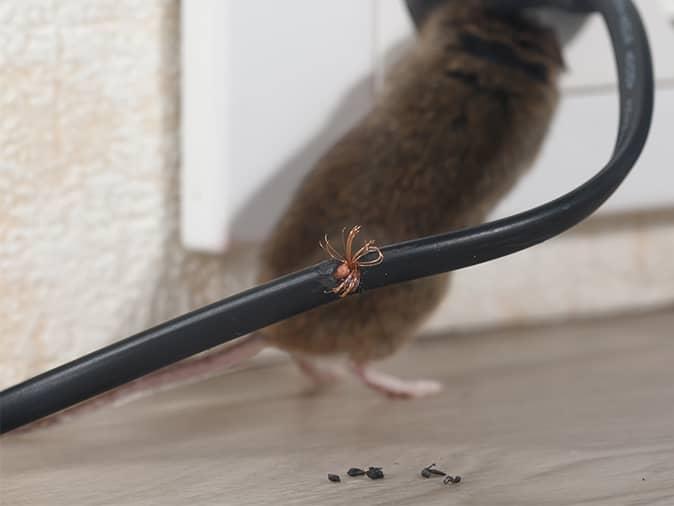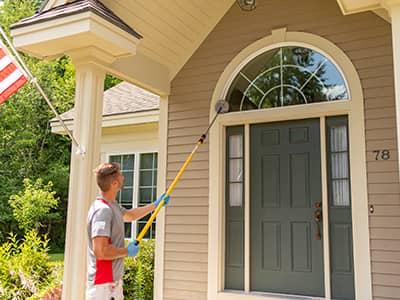October 06, 2021
Mice & rats in Maine can cause house fires
Everyone knows that rodents are a major nuisance when they infest homes. Not only do mice and rats raid our kitchens for food, damage stored items including our beloved Christmas decorations carefully made from macaroni by our children, and use the attic insulation to create nests where they breed rapidly, they have the potential to do much worse. By worse, we mean start house fires. In light of the fact that October 3rd through the 9th is National Fire Prevention Week, we thought it appropriate to discuss mice, rats and the fire hazards they create.

Rodents are to blame for approximately 20-25% of fires with unknown origins
The National Pest Management Association, in an article published on their website, stated that rodents are responsible for 20 to 25% of all fires of unknown causes. How is that so? Well as you may already know, rodents like to chew. Not only do they like to chew, chewing is absolutely necessary in order to keep their incisors from growing too long. Unfortunately, when mice and rats infest homes, they chew through just about anything they can get their teeth on and that includes electrical wires.
As you can imagine, electricity is quite hot when it goes through wires but thankfully the plastic insulation that surrounds the wire protects nearby objects from becoming overheated. When a rodent chews on the coating, it leaves the hot wire exposed and/or frayed. This can result in short circuits that cause sparks or heat that causes something nearby to ignite.
How to prevent rodent related fires
The simplest way to prevent a house fire specifically caused by mice, rats, or other rodents is to keep them out! If they don’t have the opportunity to infest your Maine home (or business), you don’t have to worry about them chewing their way through wires or anything else for that matter. Here a few prevention tips we’ve put together to help you stop rodent infestations from occurring:
- Seal all gaps and cracks along the structure’s foundation
- Close all openings that are one-fourth of an inch or larger, this includes from ground level to the top of the roof
- Keep your garage doors closed when not in use and do not leave your basement bulkhead open
- Trim trees, shrubs, and other landscape elements so that they do not provide a bridge to any part of your structure
- Remove potential harborages close to your home such as, wood piles, old cars, and heavy vegetation
- Eliminate food sources outside such as pet food, bird feeders, and fruit that has fallen from trees
- Harvest your garden and fruit trees regularly
What to do if you already have a mouse problem in your home
If you’re hearing noises coming from your ceiling especially at night, have found mouse excrement in the attic, garage, or somewhere else in your home, or have seen a live mouse scurrying along a wall inside, contact Pine State Pest Solutions right away for effective rodent control services in Portland, Auburn, and Brunswick as well as elsewhere in our multi-county service area. While we do offer one-time rodent control services, we highly recommend signing up for a home pest control plan that protects your home and family from mice, Norway rats, and more than 50 common house-infesting pests common to the Pine Tree state.
Home Protection Plan
Starting as low as $35/month*

Pine State’s Home Protection is an affordable pest control plan that is ideal for homeowners who want general pest control services that target common house-infesting insects and rodents.
When you sign up for this ongoing service, you’ll receive an initial service visit to treat the existing pest problem and then seasonal service visits spread out over the year to ensure pests stay out. That’s a total of four services annually.
Pests covered under Pine State’s Home Protection plan include carpenter ants, cornfield ants, crazy ants, field ants, little black ants, pavement ants, carpet beetles, cigarette beetles, drugstore beetles, flour beetles, ground beetles, hide beetles, larder beetles, saw-toothed grain beetles, warehouse beetles, boxelder bugs, carpenter bees, centipedes, clover mites, American cockroaches, brown-banded cockroaches, wood cockroaches, field crickets, house crickets, European earwigs, firebrats, bald-faced hornets, European hornets, deer mice, house mice, millipedes, Angoumois grain moths, drain moths, Indian meal moths, Mediterranean flour moths, mud daubers, Norway rats, paper wasps, pill bugs, rice weevils, silverfish, sow bugs, springtails, cellar spiders, daddy longlegs spiders, house spiders, jumping spiders, sac spiders, wolf spiders, Western conifer seed bugs, and yellow jackets.
*Some exclusions apply- please see your agreement

 Subscribe
Subscribe